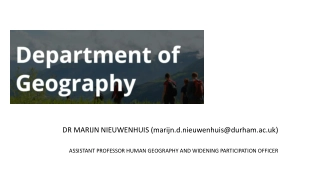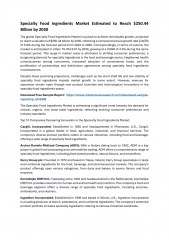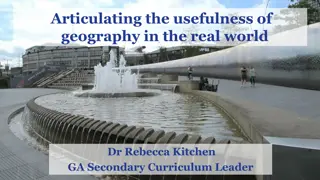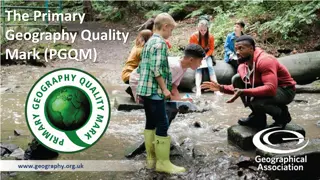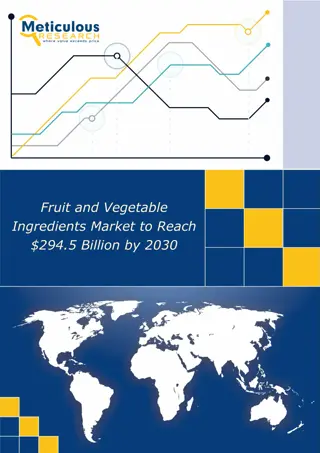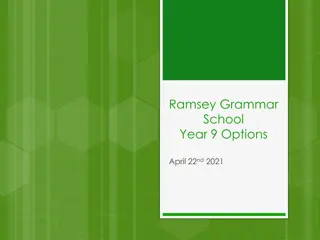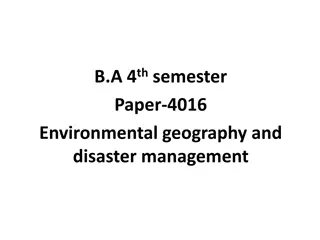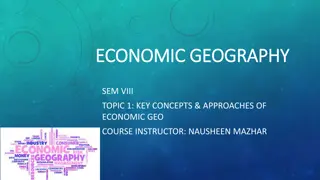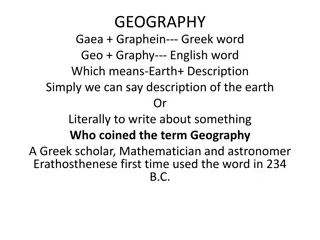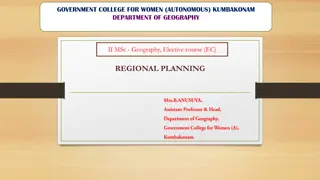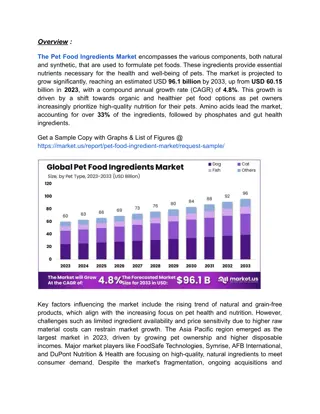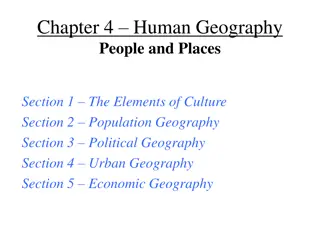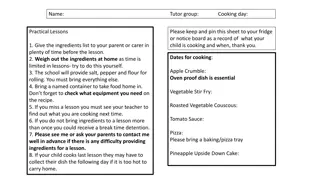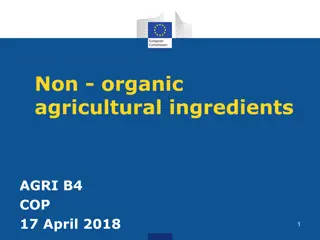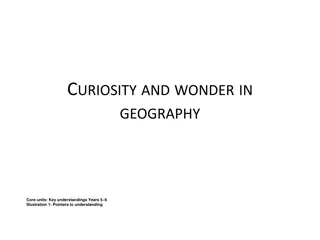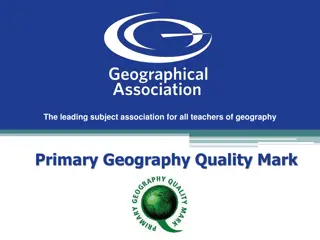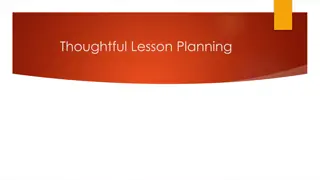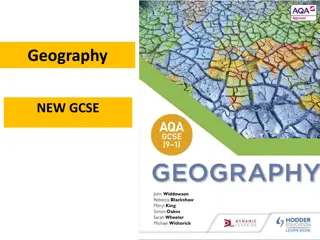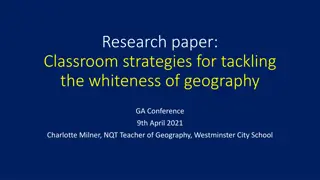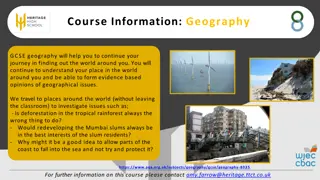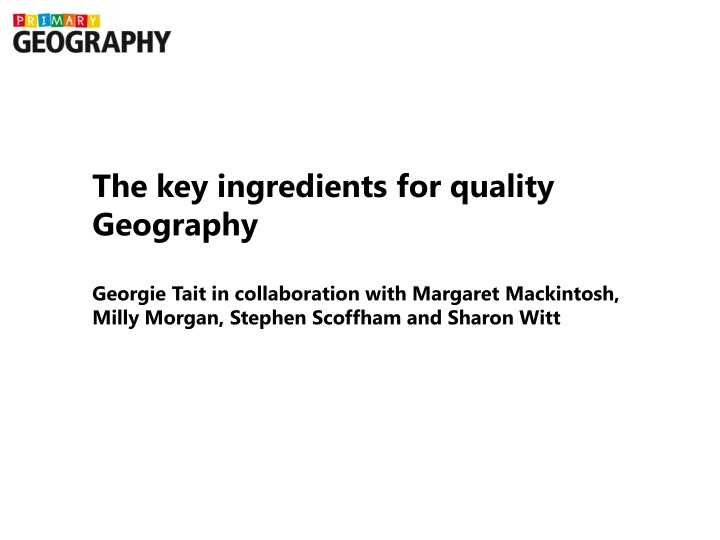
Essential Ingredients for Quality Geography Education
The key ingredients for quality geography education encompass three essential threads of knowledge: propositional, substantive, and procedural. These threads combine facts, information, place and thematic studies, and key subject concepts, providing a foundation for effective geographical learning. Propositional knowledge involves understanding factual statements, substantive knowledge helps make sense of information about the environment, and procedural knowledge entails practical skills for engaging with geographical information. Key concepts in primary geography education include cultural awareness, place, interconnections, space, scale, environment, and sustainability.
Download Presentation

Please find below an Image/Link to download the presentation.
The content on the website is provided AS IS for your information and personal use only. It may not be sold, licensed, or shared on other websites without obtaining consent from the author. If you encounter any issues during the download, it is possible that the publisher has removed the file from their server.
You are allowed to download the files provided on this website for personal or commercial use, subject to the condition that they are used lawfully. All files are the property of their respective owners.
The content on the website is provided AS IS for your information and personal use only. It may not be sold, licensed, or shared on other websites without obtaining consent from the author.
E N D
Presentation Transcript
The key ingredients for quality Geography Georgie Tait in collaboration with Margaret Mackintosh, Milly Morgan, Stephen Scoffham and Sharon Witt
This guidance aims to highlight the key ingredients that will help trainee teachers, primary teachers and subject and curriculum leaders to embed high-quality geography in their lessons.
Geographical knowledge There are three different threads of knowledge that are essential to all geographical learning: Propositional Substantive Procedural. Together these combine facts and information, place and thematic studies and key subject concepts
Propositional knowledge refers to the understanding and comprehension of factual statements relating to geography that involves knowing specific information about Earth s physical, human and environmental features such as countries, continents, rivers and climates as well as populations and cultures. It is true, factual information such as knowing what a road or a river is. This has been called the vocabulary of geography. Substantive knowledge helps us make sense of the facts and information about the environment and places. It leads us to question the physical and human geography of the world asking how does that happen? or why did this happen? . It provides a deeper understanding which is a basis for pupils to investigate and explore the world. This has been called the grammar of geography. Procedural knowledge refers to the practical skills and processes that pupils acquire to navigate and engage with geographical information effectively: enquiry/questioning, identifying and exploring similarity/difference, continuity/change, cause/consequence (or process/response) and acquiring geographical vocabulary.
Key concepts Key concepts form the building blocks for primary geography education, allowing pupils to develop a broader understanding of the world and its complexities. As pupils progress, these concepts become more intricate, providing a solid foundation for further geographical exploration and analysis in later key stages. Cultural awareness and diversity (Local and global) Similarities and differences in people s lives and connections with the natural world. Place What is in this place? What happens there? How do places change? How do we respond to places? Interconnections Links between features, places, events, processes, movements and people. Space The formal layout of the environment, where places are located Scale Local, regional, national, continental etc. Environment (physical and human processes) The surface of Earth, landscape, geology and human actions affecting the world. Environmental impact and sustainability The care of environments and interactions between human and natural environments.
Key skills The key skills outline how geography can be communicated through different ways, and include: Maps Graphicacy Vocabulary Fieldwork.
Engaging and inclusive learning experiences Primary pupils can become good geographers through engaging in a range of activities both within and beyond the classroom. Practical investigations and fieldwork in the local environment are an excellent way to develop their understanding and help to bring learning to life. Enquiry is a signature pedagogy for geography and enquiry questions have a key role in role in framing pupils studies.
Engaging and inclusive learning experiences Primary pupils can become good geographers through engaging in a range of activities both within and beyond the classroom. Pupils will develop their geographical understanding through: Thinking: Asking questions about the world around them. Challenging scenarios and taking ownership of enquiry opportunities. Observing: Hands-on explorations and fieldwork observations encourages pupils to explore their local and immediate surroundings as well as nearby villages, towns and cities. They can investigate their school grounds or nearby landmarks. Working: Becoming graphicate by learning to use a variety of different pictorial sources such as graphicacy and maps and atlases to investigate places leading to an understanding of map symbols and grid references. Experimenting: Virtual tools such as online digital mapping resources, virtual globes and immersive experiences such as Virtual Reality. Connecting: Making real-world connections which show how geography is relevant in everyday life. Discussing topics such as climate change, environmental issues and global events to help them understand the significance of geography in the world. Engaging: Engaging with real events or competitions organised by local authorities and charities and liaising with societies such as WWF, National Geographic, Geographical Association. Acting: Undertaking practical projects and investigations in their local environment. Investigating: Through enquiry-led opportunities.
Engaging and inclusive learning experiences Primary pupils can become good geographers through engaging in a range of activities both within and beyond the classroom. Good quality fieldwork experiences help pupils connect to their local environments: Walks, routes, and trails Explorations of built and natural environments Spaces for den building and creating and making places. Stories and other media of people and places, that challenge stereotypical thinking. A variety of essentially pictorial resources including photographs, diagrams, maps, aerial images (oblique drone and satellite aerial images), globes and atlases Equipment for different types of weather, such as wellies and waterproofs Geography detective equipment notebooks, magnifying glasses, mirrors, compasses, and cameras Tools to attend to the minute detail of everyday places: viewfinders, marbles, miniature figures, googly eyes, etc. Identification charts for flora, fungi, and fauna. Access to digital devices to record photographs, sounds and to use a range of apps to support geographical learning. A range of sources of information digital and brochures- information, travel, timetables, letters, postcards, stamps etc.
Effective teaching Effective primary geography teachers foster pupils geographical learning by: Having an enthusiasm for geography to inspire pupils curiosity and interest in the world around them. Building upon pupils own experiences Having clear and concise communication when explaining geographical concepts Listening to pupils questions and ideas and responding to them Leading pupils through geographical enquiry opportunities Providing creative and engaging geographical opportunities through visual aids, storytelling and hands-on activities which enhances learning and retention Promoting cultural sensitivity and inclusivity in the classroom, encouraging pupils to appreciate and respect different perspectives and backgrounds Building a positive and supportive classroom environment where they show empathy towards others Using and developing geographical vocabulary Using and developing pupils graphicacy skills Encouraging curiosity for pupils to ask questions and create a sense of wonder that motivates the pupils to become active learners Relating geography to real-life examples to make geography meaningful to pupils. Promoting critical thinking and problem-solving skills to help pupils develop a deeper understanding of geographical concepts Enhancing learning experiences by using the indoor and outdoor environments wisely Organising field trips to allow pupils to experience geography first-hand and develop their fieldwork skills, making learning more tangible and memorable.
Planning provision checklist Do you have a clear focus of your topic/unit of work? What links are made to the National Curriculum? Have you used an overarching key question/s for each topic for people to investigate so this runs like a golden thread through each lesson? Does the unit result in an opportunity for children to answer the key question with confidence using evidence from their learning journey? Does the unit allow pupils to gain their locational knowledge progressively, building upon prior knowledge? Does planning clearly build opportunities for pupils to become increasingly adept at locating places? Are lessons clear on which key concepts, processes and skills are being explored? What is the key substantive knowledge pupils will gain in the lesson? Are pupils given regular opportunities to be engaged in thinking geographically? What do they already know and where do you want them to go? Have you used a good range of appropriate resources including ICT to bring learning to life? Are graphicacy, including mapping, skills built in tandem with places studied and a variety of types of pictorial resources including maps used? Have you included physical and human geography with opportunities for pupils to describe and understand key aspects? Are these repeated in each year group and become more complex as they progress through the curriculum? Are fieldwork and observational opportunities planned into the curriculum for each year group?
Planning provision checklist (continued) Have you effectively used the local environment to raise pupils awareness of the immediate world around them? Do pupils have a good understanding of component parts before attempting composite tasks? Is the curriculum planned to ensure pupils gain a secure knowledge, remembering long term the different aspects of geography? Have you allowed for consolidation and revisiting of different contexts as well as making links between different topics in year groups and subjects where possible? Are there frequent recall and retrieval opportunities in lessons? Have activities been planned to develop skills in a real context and not in isolation? How will these support their learning? Is key geographical vocabulary identified in each lesson? How are graphicacy and oracy embedded in each lesson/unit/year group? Are there opportunities for teachers to draw on their own experiences as well as disciplinary knowledge and skills to instill pupils with a love of geography? Do you catch teachable moments such as a volcano erupting or significant changes to a road in your locality? Do you use topical issues relevant to pupils lives? How do you assess what has been learnt? How do you provide feedback to pupils?


